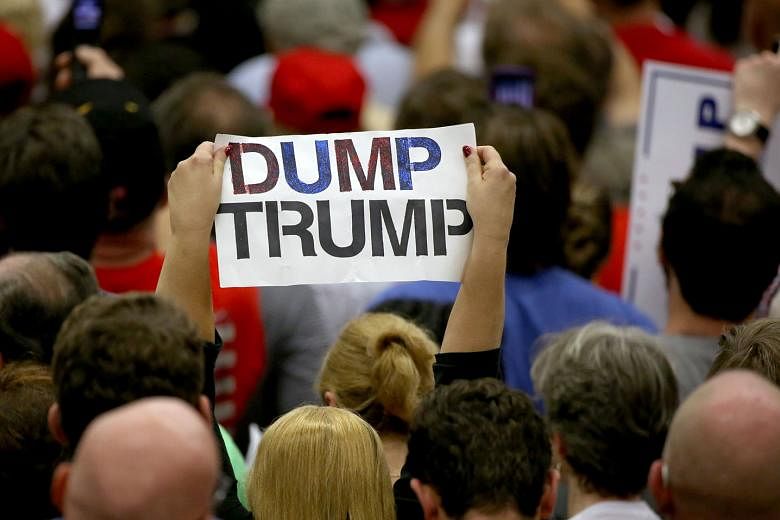WASHINGTON • In a crazy election season that has seen more than its fair share of political pundits end up with egg on the face, few are prepared to stick their neck out with a prediction three months out from the polls. But in private conversations, political watchers and number crunchers here are slowly but surely coming round to a consensus: Barring a cataclysmic turn of events for Mrs Hillary Clinton, Republican Donald Trump will lose the election on Nov 8.
The torrid past few weeks for the billionaire's campaign has left him in the sort of hole that no previous candidate has ever been able to climb out of. And though there is still time to turn it around, practically no one outside the campaign believes he can do it. Every poll released since the two parties held their conventions in July shows a growing gap between Mr Trump and Democratic Party nominee Hillary Clinton in every state that matters.
A Washington Post poll this week put him 14 points behind Mrs Clinton among registered voters in the state, while a Monmouth University survey put him nine points behind in the key swing state of Florida.
Nationally, what was a tie heading into the two conventions has become between a 6- and 7-percentage-point lead for Mrs Clinton. Though that may not sound like a lot, no candidate in the modern era facing this deficit at this point in the race has ever gone on to win the White House. In the previous 16 elections, the candidate holding a lead coming out of the party conventions has gone on to win the White House.
If it is clear that Mr Trump is currently losing badly, what is less clear is why that is happening or what he can do to get out of his slump. The past few weeks may have seen his campaign plagued by a series of scandals centred on inflammatory statements made by the candidate, but this is hardly a new situation for the businessman. His campaign has rolled along for a year unfazed by one controversial statement after another. In fact, the political showman seems to have thrived because of his blunt, unfiltered style.
 A protester with an anti-Trump sign at a campaign event for Mr Trump in Fairfield, Connecticut in the US. Every poll released since the Republican and Democratic parties held their
A protester with an anti-Trump sign at a campaign event for Mr Trump in Fairfield, Connecticut in the US. Every poll released since the Republican and Democratic parties held their
conventions in July shows a growing gap between Mr Trump and Democratic Party nominee Mrs Clinton in every state that matters. PHOTO: REUTERS
So it is perhaps a little puzzling that his recent outbursts - encouraging Russian hackers to target his opponent, getting into a prolonged war of words with the family of an American war hero, appearing to incite gun rights supporters to commit violence against Mrs Clinton, calling President Barack Obama the founder of ISIS (the Islamic State in Iraq and Syria) and petulantly delaying an endorsement of House Speaker Paul Ryan - have suddenly started to hurt him in the polls.
A NARROW, FLIMSY TENT
The polls suggest two explanations for the sudden gap - both appearing to confirm the notion that a party primary and and a general election are two very different beasts that need to be tamed with two very different strategies.
Firstly, whereas Mr Trump has done well to cultivate a loyal following among the disgruntled faction of the Republican base, he has done little since to broaden the tent. By continuing to focus on feeding his loyal base of supporters with red meat rhetoric, he has alienated the independents that are so critical to presidential campaigns. With a convention and subsequent speeches focused on attacking Mrs Clinton and presenting a negative image of the current state of the nation, he missed out on the opportunity of making a broader appeal to those unaffiliated voters watching on TV.
Combine that with the lack of a traditional field operation needed to knock on doors and hand out fliers, as well as a lag in rolling out TV advertising, and the Trump campaign is clearly starting at a disadvantage when it comes to reaching out to undecided voters. Mr Trump trails Mrs Clinton 41 per cent to 48 per cent among independents nationwide, according to a Bloomberg poll, while a survey in Florida puts that gap at 17 percentage points.
The second likely reason for Mr Trump's current slump is that he also clearly failed to unify the party in the same way that the Democrats have. While both conventions evidently laid bare the divisions that continue to plague both sides, the polling numbers that came after have made it clear that one party's unification problems are bigger than the other's.
Thanks in part to the constant and public pleas by Senator Bernie Sanders for his fans to support Mrs Clinton, the Democratic nominee can boast around 90 per cent support from self-identified Democrats. Mr Trump, who meanwhile saw a host of high-profile Republicans either stay away or give half-hearted endorsements, has attracted the support of only around 70 per cent of the members of his own party. His provocative style seems to have counteracted some of the gains he made off the anti-establishment mood.
The broad tent of support candidates are supposed to build to win a general election is looking a little narrow and flimsy for Mr Trump. While this problem with independents and undecided Republicans was likely there all along, they are starting to show up in polls now because this is the point in the election year when more people start paying attention.
If history is any indication, then the better part of everything that has taken place so far has been the preserve of politicos and hardcore party supporters. It is only as we approach the final stretch that ordinary Americans - both Republicans and independents - start taking politics more seriously.
Perception is an important currency in any race and while both candidates have high unfavourability ratings, one has spent the past two weeks rolling out plans and endorsements while the other has been putting out fires. For the layman only just starting to pay attention to the election, the surprise perhaps might be that Mrs Clinton isn't holding a larger lead.
DOWN, BUT NOT YET OUT
To be clear, poll numbers this far out from an election are not an end in themselves, but they do influence the campaign in many significant ways.
Money is a vital finite resource and as the likelihood of losing increases - the New York Times now puts Mr Trump's chances at just 12 per cent - it becomes harder to come by. Donors start giving less and the party starts asking if it should continue to funnel the money it already has towards a losing candidate.
Just last week, more than 70 Republicans signed an open letter calling on the party to reallocate resources away from the presidential race, and towards House and Senate races - saying that this was the only way to prevent the party from "drowning with a Trump-emblazoned anchor around its neck".
And while all of this should put a grin on the faces of Hillary Clinton supporters, it may still be too early to celebrate. After all, the standard 2016 election disclaimer now applies to any prediction: Mrs Clinton has blown big leads before and Mr Trump has come back after being written off. Three months can be a long time in an election cycle and Mr Trump arguably still has enough of a runway to turn things around.
Mr Trump's running mate Mike Pence reportedly said last week at the Republican Governors Association meeting that the real contest begins on Sept 5 : "It's pre-season, for heaven's sake. The gun starts on Labour Day."
Already, there is some recognition within the campaign that they are in a crisis. It is uncommon for a campaign to rejig its top leadership like Mr Trump did this week, effectively demoting his campaign chairman Paul Manafort.
The upcoming round of presidential debates, starting on Sept 26, between Mrs Clinton and Mr Trump are especially critical if the Republican is to stage a comeback. Pundits are split on whether such a format favours Mrs Clinton's more controlled approach or Mr Trump's freewheeling style but it is at least an opportunity for the Republican to gain ground.
Still, to at least stop the slide before then, the Republican Party will need to make Mr Trump do something he hasn't managed all year - tame his tongue. Otherwise, this race may be over before it has really begun.


